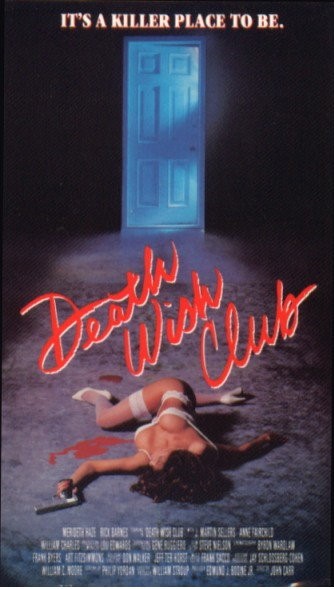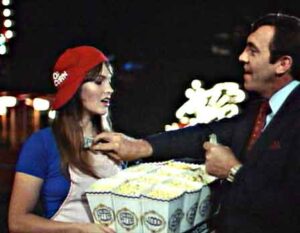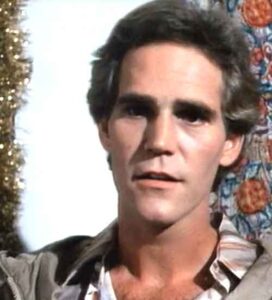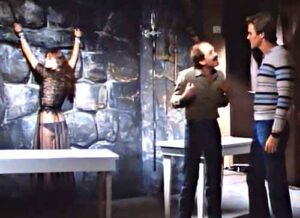A film that seems destined to be best known in cut-down form, as part of the anthology film NIGHT TRAIN TO TERROR (1985). That three-parter was scripted by the veteran Hollywood legend Philip Yordan, as were its feature iterations THE NIGHTMARE NEVER ENDS/CATACLYSM (1980), SCREAM YOUR HEAD OFF/HARRY (1992) and DEATH WISH CLUB (1984; originally titled GRETTA, and later released on VHS as CARNIVAL OF FOOLS), the most interesting film of the bunch.
Inspired, allegedly, by Erskine Caldwell’s 1963 novel GRETTA (“About a Woman Whose Weakness Was to Love Too Many Men”), DEATH WISH CLUB’s production was a hodgepodge. In common with Yordan’s other no-budget films of the 1970s and 80s, several disparate narrative strands came about as a result of multiple rewrites and reshoots (three cinematographers are credited) and an extremely protracted postproduction. The film’s fate was predictable: it was released to the VHS market in several different cuts, with its definitive version presented in the form of a poorly mastered extra on the 2013 Vinegar Syndrome NIGHT TRAIN TO TERROR DVD.
It all begins with a scene excised from most prints: the wealthy middle-aged lech George Youngmeyer (J. Martin Sellers) gets dressed in his mansion, musing in voice-over about his longing for unrequited love. He appears to have found his ideal mate in Gretta (Merideth Haze), a young hottie first seen selling popcorn at a carnival. George inducts her into a world of illicit sex and pornographic films, one of which provides college student Glen Marshall (Rick Barnes) with his initial glimpse of Gretta. He’s immediately smitten, and becomes determined to track her down.
He eventually finds her playing piano in a seedy nightclub. Also present is George, who warns Glen against consorting with Gretta, as “she lives in the fourth dimension. It’s not a nice place there.” Glen, however, insists on initiating a relationship with Gretta, and is sucked into her weird world. This entails a trip to the Death Wish Club, in which Glen, Gretta and George join three other people in an elaborate suicide game involving a potentially life-ending agent that initially takes the form of a deadly flying insect let loose in the room with them. Next an electrical current is hooked up to each participant, one of whom stands to be fried.
Before that can happen Gretta “dies” in an apparent overdose, only to return as Charlie White, a womanizing lout who talks and acts like a gangster from one of Philip Yordan’s 1940s-era screenplays. Glen does what he can to snap his lover back to reality, but it seems “Charlie” is set in his macho ways, and destined to join Glen and George for a final encounter in the Death Wish Club.
DEATH WISH CLUB’s production values and filmmaking are redolent of a student film (even though director John Carr was a twenty year veteran). Such amateurishness actually fits the terminally loony script by Yordan, with its piecemeal construction and schizophrenic tone that falls somewhere between Frank Capra and John Waters. Included in the film’s lunatic tapestry are dwarfs, a highly stereotypical Jewish couple who live next door to Glen (and regularly listen to him and Gretta having sex), a dirty old man (played by Yordan) and a trans wedding—things that, depending on one’s point of view, come off as either hopelessly discordant or oddly harmonious.
Towering over it all is the lead performance of Merideth Haze, who’s called upon to play both a woman and a man, and in both cases makes quite an impression. Her acting style is essentially summed up by her last name, but the lovely Ms. Haze has undeniable screen presence, and I can’t imagine anyone else in her role(s).
Vital Statistics
DEATH WISH CLUB (a.k.a. GRETTA, CARNIVAL OF FOOLS)
Pan American Pictures Corporation
Director: John Carr
Producer: Edmund J. Bodine Jr.
Screenplay: Philip Yordan
Cinematography: Frank Byers, Art Fitzsimmons, Byron Wardlow
Cast: Merideth Haze, Rick Barnes, J. Martin Sellers, “Anne Fairchild” (Toni Covington), William Charles, Paul Keefer, Mark Ridley, Theresa Jenson, David Lee Daniels, Lou Dornbush, Dorothy Mitchell, Jacques Saffell, Michael G. Cavanaugh, Tom Costello, Patti O’Malley, Kelly Parn, Ruth Gentry, Philip Yordan, Peter Creadick, Phyllis Guerrini




